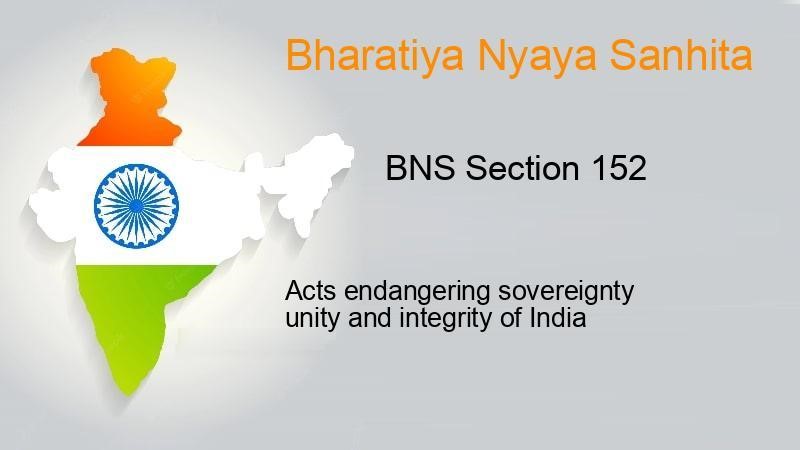Section 152 of BNS: Potential for Sedition Abuses
Syllabus:
GS-2:
Government Policies & Interventions
Focus:
The Rajasthan High Court cautioned against using Section 152 of the Bharatiya Nyaya Sanhita (BNS) to stifle legitimate dissent. This section criminalizes acts endangering India’s sovereignty, unity, and integrity, raising concerns about its misuse, especially following the Supreme Court’s suspension of sedition law under Section 124A IPC.
Section 152 of BNS: A Proxy for Sedition?
The Rajasthan High Court, in its judgment on Tejender Pal Singh v. State of Rajasthan (2024), has raised concerns over Section 152 of the Bharatiya Nyaya Sanhita (BNS), warning that it should not be used to suppress legitimate dissent. While the BNS doesn’t explicitly mention sedition, the court’s ruling hints at the possibility of Section 152 becoming a tool for stifling free speech, much like the now-reconsidered Section 124A of the Indian Penal Code (IPC). Section 124A, which dealt with sedition, was suspended by the Supreme Court in 2022, awaiting reconsideration. Section 152 of the BNS criminalizes acts that could endanger the sovereignty, unity, and integrity of India, but it does so in a manner that remains open to abuse.
Understanding Sedition Under BNS:● Section 152 of BNS criminalizes acts inciting secession, armed rebellion, subversive activities, or separatism that threaten India’s sovereignty, unity, and integrity. ● Origin: Derived from Section 124A of IPC, introduced by the British in 1870 to punish acts against the Crown. ● Punishment: BNS imposes harsher punishment than IPC; life imprisonment or up to seven years, plus a mandatory fine. ● Legislative Purpose: Aimed at preventing destabilization and protecting national integrity, given India’s historical secessionist movements. Key Differences Between Section 124A IPC and Section 152 BNS:
Important Case Laws on Sedition:● Kedar Nath Singh v. State of Bihar (1962) ○ Supreme Court upheld Section 124A’s constitutionality but limited its application to acts inciting violence or public disorder. ● Dr. Vinayak Sen v. State of Chhattisgarh (2011) ○ Court clarified that sedition involves disruption of public order, attempts to overthrow the government, or threatening national security. |
Key Concerns with Section 152 of the BNS:
Lack of Definition for Endangering National Integrity
- Vague language: Section 152 criminalizes acts that endanger the sovereignty, unity, and integrity of India, but it does not define what constitutes “endangerment.” This vagueness leaves it open to interpretation by enforcement agencies, potentially allowing a wide range of activities, including criticism of public figures or political speech, to be treated as a threat to national integrity.
- Potential for abuse: In a politically charged environment, this lack of clarity can be used to stifle free speech, where simple acts of criticism can be construed as attempts to harm national unity or sovereignty.
The Term ‘Knowingly’ Lowers the Threshold for Offense
- Social media implications: Section 152 includes the term “knowingly”, which lowers the threshold for committing an offense. This means that even without malicious intent, individuals could be held liable if their actions, such as sharing content on social media, are deemed likely to provoke anti-national sentiments.
- Chilling effect on free speech: Since the provision is cognizable and non-bailable, individuals can face arrest for merely sharing information or expressing opinions that could be interpreted as a threat to national unity.
- Absence of a causal link requirement: There is no requirement to establish a causal link between speech and its actual consequences, which makes it prone to abuse and could lead to unjust deprivation of liberty without clear evidence of harm.
Historical Context of Sedition Laws and Data on Abuse
- Comparing with sedition law: When Section 124A (sedition) of the IPC was in effect, the National Crime Records Bureau (NCRB) reported that only a handful of those arrested under sedition charges were actually convicted. Between 2015 and 2020, 548 people were arrested for sedition, but only 12 convictions were made. This highlights the misuse of sedition laws, which could easily extend to Section 152 due to its broader and less defined scope.
- Lack of learning from past mistakes: Despite the abuse of the sedition law, Section 152 of the BNS appears to share similar risks but with even more room for misinterpretation and misuse by authorities.
The Way Forward: Ensuring Proper Use of Section 152
Judicial Interpretation for a Balanced Approach
- Consequentialist approach: The Supreme Court has consistently applied a consequentialist approach in interpreting laws related to freedom of speech. In cases like Balwant Singh v. State of Punjab (1995) and Javed Ahmad Hazam v. State of Maharashtra (2024), the Court emphasized the need for a direct causal nexus between speech and its consequences before considering it an offense. This approach should be applied to Section 152 as well.
- Guidelines for enforcement authorities: The Supreme Court should issue guidelines to help enforcement agencies interpret and apply Section 152, as it did in the K. Basu v. State of West Bengal case. This would prevent authorities from using the provision arbitrarily or excessively.
Defining Key Terms in Section 152
- Clarity on terms: To avoid misuse, the terms like “endangering national sovereignty,” “encouraging separatism,” and “armed rebellion” need to be clearly defined. Without these definitions, the provision remains too vague and can be exploited to suppress dissent.
- Legislative review: Section 152 should be subject to legislative scrutiny to ensure that its application aligns with constitutional values, particularly the right to free speech guaranteed under Article 19.
Protection for Dissent and Expression
- Promoting free speech: In a democracy, it is essential to protect freedom of expression, even if it involves criticizing government actions or policies. The concept of a marketplace of ideas, as envisioned by Justice Holmes in Abrams v. United States, should be upheld. The best test for the truth of an idea is its ability to survive in the marketplace of democratic discourse.
- Role of social media: Given the increasing role of social media in public discourse, there should be a relaxed approach to online expression, recognizing that not all shared content or opinions are intended to incite violence or sedition.
Safeguards Against Misuse
- Preventing chilling effect: Strict safeguards need to be in place to prevent abuses of Section 152 that could lead to self-censorship among citizens or deter them from voicing legitimate concerns. For instance, there should be a requirement for evidence of actual harm caused by speech before prosecuting individuals under this section.
- Better training for authorities: Law enforcement agencies need to be trained in interpreting such provisions with caution, keeping in mind their potential impact on democratic values and individual freedoms.
Conclusion: Balancing National Security and Freedom of Expression
Section 152 of the BNS has the potential to undermine the right to free expression if left unchecked. While national security and the integrity of the nation must be preserved, it is equally important to ensure that these provisions do not become tools for stifling dissent or criticism of the government. The judiciary, along with legislative scrutiny, must ensure that freedom of speech is upheld and that laws like Section 152 are applied fairly and with caution. The Supreme Court should take proactive steps to safeguard democracy and prevent this provision from becoming a proxy for sedition, ensuring that it is used only when absolutely necessary and with proper legal safeguards.
Source: The Hindu
Mains Practice Question:
- Examine the implications of Section 152 of the BNS on free speech in India. How can its misuse impact democratic values?
- Discuss the role of judicial interpretation in safeguarding freedom of expression while addressing national security concerns in the context of laws like Section 152 of the BNS.





